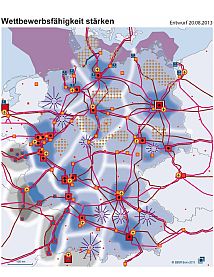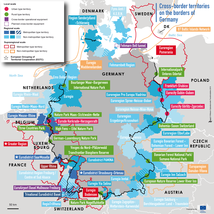Germany: Cross-border cooperation in Germany's territorial development policy
With the approvalin March 2016 by both the German Länder and the federal level of its "Guiding Principles", Germany is emphasising cross-border cooperation in its territorial development policy.
The document ("Leitbilder und Handlungsstrategien für die Raumentwicklung in Deutschland"), which was adopted on 9 March 2016 by the conference of German ministers responsible for territorial development, now takes account of the potential for European cross-border integration.
The diagram relating to competitiveness along Germany's borders includes "border metropolitan regions" and "areas of enhanced metropolitan integration in border metropolitan regions". It is based on mapping by the IMeG (see below) and statistical work on cross-border functional urban areas.
The legislation on territorial development ("Raumordnungsgesetz, § 26 Zusammenarbeit von Bund und Ländern") states that "the Bund and the Länder can, within the framework of the conference of ministers responsible for territorial development draw up guiding principles for territorial development in Germany and for contexts that go beyond the competence of the Länder". Moreover, the "Bund contributes, in cooperation with the Länder, to territorial cohesion policy in the EU and in the wider European region. The Bund and Länder cooperate closely on cross-border cooperation with neighbouring countries in the area of territorial development".
The legislation also states that the Federal Office for Building and Regional Planning (BBR) "manages an information system on territorial development in federal territory and adjacent areas. The Federal Ministry of Transport and Digital Infrastructure makes the information system's findings available to the Länder".
IMeG - Cross-Border Metropolitan Regions Initiative
The IMeG (Initiativkreis Metropolitane Grenzregionen) is a project of the "MORO" spatial planning research programme of the German Federal Ministry of Transport, Building and Urban Development (BMVBS) that was carried out between April 2011 and November 2013. The project promotes the concept of cross-border metropolitan regions along Germany’s borders (the Euregio Meuse-Rhine, Greater Region, Upper Rhine and Lake Constance). A conference held in November 2012, in cooperation with the planning authorities in Luxembourg, opened up a European perspective that is also reflected in the report, with concrete examples of other cross-border metropolitan regions in Europe. It is aimed at players involved in territorial development at the regional, national and European levels, who are urged to take account of this concept in the implementation of cohesion and transport policy, but also at the general public, with a view to promoting greater territorial cohesion.
Project’s final report, 2013
More info on the IMeG's website
"MORO" – pilot projects devoted to cross-border cooperation in Germany
Several spatial planning pilot projects (MORO), such as the one that led to the setting-up of the IMeG, incorporating border region and cross-border considerations have been launched in Germany.
More info on the "MORO" pilot projects
"Territorial observation in Germany and neighbouring regions" project (2015-2017)
This project was launched in 2015 as part of the German MORO programme on "Pilot projects in spatial planning". Its objective is to lay the foundations for border region observation along Germany's borders. It was wound up at a conference of experts in Berlin on 9-10 November 2017. Through the study of seven model regions along Germany's borders, the aim was to identify indicators designed to monitor living conditions in these regions, and to formulate recommendations regarding actions to be implemented.
The report concludes that the joint development of regional strategies alone justifies the improvement of their system of cross-border territorial observation. It recommends the optimisation of cooperation between statistical authorities on either side of the border and the design of innovative initiatives in this domain.
More info



